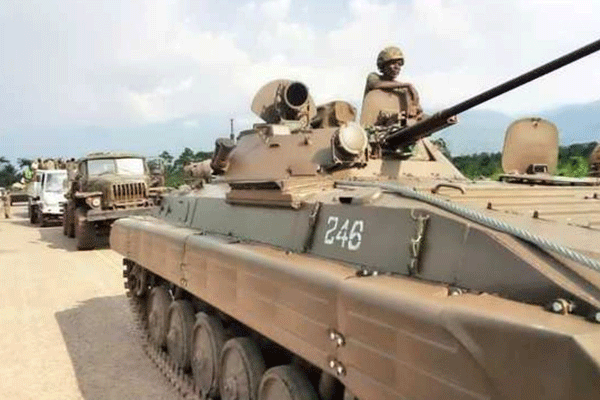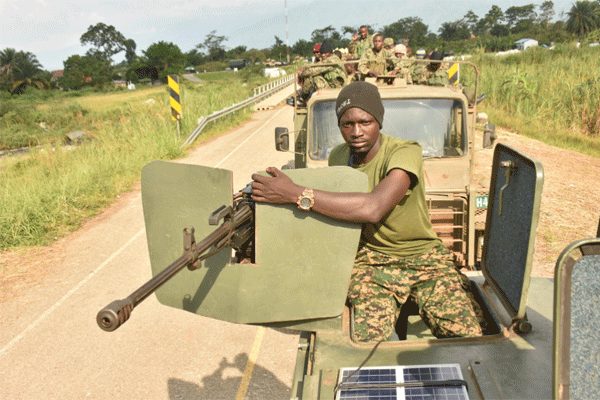Prime
Uganda goes after ADF in Congo bases, denies claims of bombing civilian homes

Uganda People’s Defence Forces head for Eastern Congo jungle, from where the Allied Democratic Forces are believed to have been planning a series of attacks on Ugandan civilians. FILE PHOTO | COURTESY
What you need to know:
- In DRC, Uganda has deployed its US trained mountain brigade unit that has been stationed in the Rwenzori region.
Uganda on Friday dismissed as “baseless propaganda” reports that its airstrikes and artillery bombardments launched at several bases of the Allied Democratic Forces (ADF) in the Eastern Congo provinces of North Kivu and Ituri killed civilians.
This come barely days after Uganda People’s Defence Forces (UPDF) and their Congolese counterparts announced that they had started joint military operations against the ADF rebels. Kampala blames the rebel outfit of orchestrating a series of attacks on its soil, with the most recent a twin bombing in Kampala that killed three and injured over 20 people.
The UPDF carried out a series of air strikes against the ADF militants in DRC on Tuesday, an offensive that Ugandan officials said was intended to drive the militants out of their bases.
The Ugandan military bombed four bases in two locations of Beni and Ituri in North Kivu provinces according to security sources, with one of the locations believed to be the ADF headquarters and home to its top commander Musa Baluku. However, hours later report emerged that the ADF fled their camps before the aerial and artillery bombardments launched from Uganda territory on November 30.
“Clearly, that is propaganda. No one has been to these camps yet, not even our forces. We maintain that we hit our targets, and any other information is baseless,” said Brig Flavia Byekwaso, the Uganda Peoples Defence Forces spokesperson. Brig Byekwaso said the aerial raids were carried out to surprise the enemy and isolate the bases, therefore no one can claim to have details of those bombardments.
UN agencies, independent sources and non-governmental organisations that track conflict in the volatile eastern Congo told The EastAfrican that they had not picked up any information to this effect.
“We do not yet have any verified reports of civilian casualties from the ground,” says Jason Stearns, the Director Congo Research Group (CRG) which is hosted at the Centre on International Co-operation.
Mathias Gillmann, the spokesperson of the UN Stabilisation Mission in the Democratic Republic of Congo Monusco, equally could not discuss details of the raids, pointing out that force was not involved in the joint operations launched by Uganda and DRC.
“Our priority right now is to ensure a good coordination between the different military actors on the ground, in order to define how the Mission can complement efforts made against the ADF,” he said. After the airstrikes, hundreds of UPDF infantry forces crossed into DRC aboard armoured vehicles to continue ground operations against the notorious Islamic States linked ADF, which has carried out four terrorist attacks inside Uganda since October 24, killing five people and injuring scores.
The ADF has been an anti-Uganda terrorist group since mid-1990s, but recently established links with the Islamic States of Syria and Iraq (ISIS) as the its Central Africa Province, to resume urban terror attacks in the Ugandan capital. Brig Byekwaso declined to disclose the size of the force deployed for this operation, which is expected to last as long as the security threat of the ADF is still deemed significant for both Uganda and the host country, a development that Monusco also welcomed.
“Our mandate does not allow us to support a regional coalition. But that doesn't mean we can't do anything. It just means that our efforts must be coordinated to complete what possibly can be done by another military partner,” Mr Gillman told journalists on December 1.The UN force, however, emphasises that whatever is done, the actors must guarantee the protection of civilians, the access of humanitarian workers and respect for the international humanitarian aid. “We are simply saying that there needs to be coordination between what will be done in the context of these operations and the presence of Monusco on the same ground, to ensure the efficiency of the operations and the safety of the actors involved and, all of the populations living in these areas,” he added. The entry of Ugandan military into DRC comes against the backdrop of a nearly three-year intense lobbying by DRC leadership, western diplomats, and regional bodies following ADF’s continued attacks in Kampala.
Both Uganda and DRC militaries have been sharing intelligence on the issue and holding meetings in Kampala and Kinshasa to map out how the operations would go if President Étienne Tshisekedi gave a nod to Uganda’s entry into his territories. Security chiefs from both countries earlier this week met Ugandan President Yoweri Museveni at Statehouse in Entebbe and briefed him about potential bases and how to jointly flush out the rebels from their lairs, signalling that his Congolese counterpart had given the green light for Uganda to deploy.
Last week, Uganda’s junior minister for Foreign Affairs Okello Oryem told The EastAfrican that what was most important for the Ugandan army to deploy in eastern DRC was a nod from President Tshisekedi.
“We will only go to the DRC to flush out the ADF with full support and cooperation of Kinshasa, regional bodies like SADC, the UN Security Council all of which will give us some form of legitimacy. However, we have a right to self-defence and hot pursuit which we can exercise,” he said.
He added that they would ensure minimal causalities especially for women and children but Tuesday’s initial air and artillery strikes would suggest otherwise although the army has not yet reported on the strikes’ impact.
In DRC, Uganda has deployed its US trained mountain brigade unit that has been stationed in the Rwenzori region. It is headed by Maj Gen Kayanja Muhanga, who has served in South Sudan preventing a rebel takeover of Juba and in Somalia as the Ugandan contingent commander. Major Gen Muhanga will command the assault on ADF code named Shujaa, together with the commander of Uganda’s land forces and First Son Lt Gen Muhoozi Kainerugaba.
For the past few years, the debate of returning to the Eastern DRC in combat to flush out the insurgents has been ravaging within the military circles.
Addressing the nation on June 7, this year, President Museveni lashed out at the United Nations Organisation Stabilisation Mission in the Democratic Republic of the Congo (MONUSCO) for failing to bring long-term peace in Eastern DRC. “The ADF criminals in Congo will answer for the killings of our people even when they are hiding in Congo. Their only safety is for them to voluntarily surrender and seek amnesty. If, however, they were to re-enter Uganda, they would be promptly and decisively defeated,” he said then.
Mr Mathias Gillman, a MONUSCO spokesperson told reporters in Kinshasa on Wednesday that the 14,000 troop strong force will not support joint Uganda-DRC military operations because it is out of their mandate.
What remains unclear is whether Uganda got a nod from the diplomatic community and regional bodies like SADC which it has been intensely lobbying or simply had an agreement with DRC. Already, Ugandan parliament is questioning how the army started military operations in DRC without its approval. However, this is not the first time under President Museveni that the national army has deployed outside the country without approval of parliament.
On Wednesday during a special sitting, the Congolese parliament said the joint military activities should continue until both armies flush ADF out of the country. The Uganda army has been to DRC before, an excursion that saw the country’s top military officials accused of looting timber and minerals. In 1999, Kinshasa filed a case at the International Court of Justice seeking $4.3 billion in reparations payments from Uganda for its role in the conflicts in its mineral-rich Ituri province. DRC also claims a further $2.8 billion for damages to wildlife, $5.7 billion for macroeconomic damages and over $700 million for loss of natural resources, bringing the total reparation demands to over $13 billion.
But Uganda says the amount is disproportionate and could have staggering economic consequences on it.
*Written by Jonathan Kamoga and Julius Barigaba




